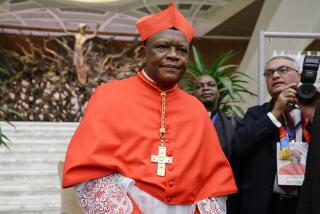U.S. Catholic Bishops Stop Short of Recommending Diplomatic Ties With Vietnam
SOUTH ORANGE, N. J. — The National Conference of Catholic Bishops Saturday called for improved relations between the United States and Vietnam but stopped short of recommending a formal restoration of diplomatic ties.
The call for improved relations, “A Time for Healing and Reconciliation,” was adopted by a unanimous voice vote.
The document, originally scheduled for a vote last fall, had been questioned by Vietnamese refugees in the United States and by some bishops from dioceses with large Vietnamese populations. Although the final document dropped a call for formal diplomatic relations, the committee that prepared it said it hoped both countries would move “beyond the legacy of a tragic war.”
The committee, headed by Los Angeles Archbishop Roger M. Mahony, said a call to normalize relations would not indicate approval of the Communist regime but that improved relations could facilitate providing humanitarian assistance and lobbying more effectively for improvements in human rights and religious liberty for the Vietnamese.
Bishop Joseph J. Madera of Fresno, Calif., who said the brother of a priest in his diocese is one of 10 priests imprisoned in Vietnam, expressed concerns that the church would be granting legitimacy to a “barbaric” regime. Two other bishops on Friday also had cautioned that the Vietnam statement was “too naive.”
In other action, the bishops overwhelmingly approved guidelines for resolving disputes involving Catholic theologians, ending a seven-year search for a middle ground between the Vatican and some church thinkers.
The guidelines adopted Saturday are aimed at averting disputes such as the one over Father Charles Curran of the Catholic University of America, who was stripped by the Vatican of his status as a Roman Catholic theologian in July, 1986, for disagreeing with the church’s positions on abortion and contraception.
Archbishop Oscar Lipscomb of Mobile, Ala., chairman of the committee that drafted the document, said that the guidelines will foster greater “collaboration and cooperation.” The final vote was 214 to 9.
The 57-page document on doctrine included sections on the rights and responsibilities of both bishops and theologians, suggestions for resolving disputes through informal discussion and formal procedures for use when that fails.
The document was withdrawn in November and revised after the Vatican objected to some of its proposals. The final draft was approved by the Vatican after a March meeting with American theologians.
Earlier, the bishops had voiced support for a continuing process aimed at answering the concerns of black Catholics.
They voted to support a committee that is working on a pastoral plan for African-Americans after listening to a presentation by Sister Thea Bowman, granddaughter of a slave and now a teacher at Xavier University in New Orleans, who led them in singing “We Shall Overcome.”
Although the number of black American Catholics has more than doubled to about 2 million since 1983, a recent survey found, too many blacks feel uncomfortable in their predominantly white churches, Bishop John Ricard, the auxiliary bishop of Baltimore, said.
Ricard said that African-American Catholics will switch to more traditionally black denominations unless they are allowed to hold leadership positions in their parishes.
More to Read
Sign up for Essential California
The most important California stories and recommendations in your inbox every morning.
You may occasionally receive promotional content from the Los Angeles Times.










